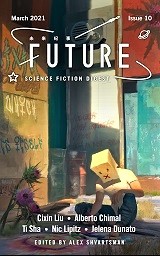 Future Science Fiction Digest #10, March 2021
Future Science Fiction Digest #10, March 2021
“The Second Celeste” by Alberto Chimal
“The Two Festivals that Cannot Coexist” by Liu Cixin
“The Office Drone” by Nic Lipitz
“Perfect Date” by Jelena Dunato
“The Final Test” by Ti Sha
Reviewed by Victoria Silverwolf
The latest issue of this magazine of international science fiction offers stories from authors based in Mexico, China, the United States, and Croatia.
The narrator of “The Second Celeste” by Mexican writer Alberto Chimal, translated from Spanish by Patrick Weill, is the duplicated consciousness of a woman who died from cancer. Flashbacks describe the woman’s relationships with her husband and the woman in charge of the project to record her mind. The way in which these relationships change after the woman’s death forms the heart of the story, with a touch of bittersweet irony at the end.
Although the theme of downloading one’s consciousness into a computer is hardly a new one, this variation on the premise is unique. The author makes it clear that the duplicate is not the same as the original; the technology is not a form of immortality. This adds a note of piquancy to what would otherwise be a familiar plot.
The author is also careful to consider technical limitations of the procedure, as well as ways it might be abused by those in power. This makes the speculative technology seem more plausible. Kudos must also go to the translator, who produces a clear, elegant, and very readable version of the original. (For readers of the translation, the fact that the narrator is obsessed with translating a poem from English into Spanish adds an extra level of interest.)
“The Two Festivals that Cannot Coexist” by Liu Cixin, translated from Chinese by Nathan Faries, takes place in the Soviet Union in 1961 and China in 2050. Both sections feature an extraterrestrial, disguised as a human being, who observes major technological advances. In the past, Yuri Gagarin becomes the first person in space. In the future, scientists create the first direct link between the human mind and a computer. The alien observer contrasts the two achievements, and reaches a conclusion about the fate of humanity.
This brief tale is a powerful allegory about two different ways in which people might face the future. The author considers how certain aspects of modern technology might be a step backward instead of forward. Readers are likely to wonder about their own lives after enjoying this fable.
The title character of “The Office Drone” by American author Nic Lipitz is a flying robot used to deliver packages, although the same term is used in an ironic way to describe its human coworkers. With the help of another sentient machine, it discovers a way to create products instead of just transporting them, leading to a revolutionary change in the workplace.
This story, told from the point of view of the robot, has a lightly satiric mood, as the distinction between human and machine workers becomes less and less meaningful. Although rather a trifle, this tale is likely to appeal to those who find their jobs less than completely fulfilling.
In “Perfect Date” by Croatian writer Jelena Dunato, a woman makes use of an android lover. Complications ensue when the artificial man prefers to remain with her, rather than return to the manufacturer to have the memory of their encounter erased, as is the normal procedure.
This very short story deals with a potentially interesting situation superficially. The ending is quite sudden, and the reader is likely to wish that the author had gone into greater detail about the relationship between the woman and humanoid machine.
“The Final Test” by Ti Sha, translated from Chinese by Judith Huang, takes place at a time when machine intelligence has replaced humanity. The main character undergoes an examination to determine whether it will be destroyed or be allowed to exist as a full citizen. The test consists of placing the artificial intelligence into virtual reality, where it faces a hostile human being. It must prove that it has free will, despite all the stubborn and illogical objections of the virtual person.
This is a story that appeals much more to the head than to the heart. It is full of philosophical musings about the nature of consciousness, as well as complex descriptions of the way in which an AI might think. Readers who welcome an intellectually challenging work of fiction are likely to appreciate it more than those looking for pure entertainment.
Victoria Silverwolf enjoyed some shishito peppers today.